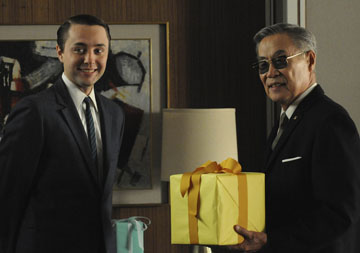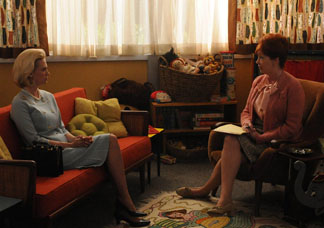Ah, an episode rife with conflict! Sweet interpersonal, intercultural, intergenerational conflict.
We have the war of Guilt vs. Shame -- "A man is shamed by being openly ridiculed and rejected. It requires an audience," Don quotes from The Chrysthanemum and the Sword. Full disclosure -- I've never read the book but a quick trip to Googleland and one learns the crux of the book is the guilt culture of Western society vs. shame culture of the East. As a contrast to a guilt society, where the individual carries the burden of wrongdoings (secret or not), shame culture dictates that social knowledge of sins determines whether the individual should suffer, and what other people believe is much more powerful than personal knowledge. And we have one of the most provocative and exciting episodes of the season. Which brings us to our first battle...
SCDP vs. CGC -- We begin with a New York Times reporter calling Don Draper to comment about the new rival firm, CGC, and their hotshot Creative Director Ted Chaough . We learn that Don's been losing accounts to them (including Clearasil -- what happened with Pete's $6 million muscling?) and the final shot of the reporter contains a literal mirror image. Again, the show uses the parallel to reflect similarities and ultimately, the differences that will determine the situational outcomes. (Thank you to last week's comment with a terrific link to the use of the mirror!)
Meanwhile, the two firms are chasing the Honda account. The client gives all competing firms $3,000 with the stipulation that there can be no finished work. Though Don first wants to make a bank-busting commercial, the team at SCDP realizes that to woo this one potential client would bankrupt them, but the illusion of such could also bring their main competitor to financial ruin. With a lousy hand, Don, master of constructing mirages, decides to bluff CGC and make 'em think SCDP is creating a rule-breaking, big budget commercial. CGC takes the bait and produces a commercial way over their $3,000 budget and also breaking the client's rules of no finished work. As Lane states, the future of SCDP is dependent on eliminating CGC.
In the end, CGC blows their budget and breaks the client's rules, which Don uses to his advantage. Instead of a presentation, Don presents a $3,000 check to the Honda suits and declares that he won't be a part of an unfair game. "You did not honor your own rules," the translator says to the president of Honda. Don wins the Honda battle knowing that honor is a currency more valuable than a flashy commercial.
Though the firms are similar in size, the one thing they don't have is Don Draper. "The man's a genius," a CGC employee (and formerly of Sterling Cooper) remarks. This is also shown with Chaough's initial and stupid concept for the commercial, which amounted to 'ride a Honda and you'll be a transsexual!' Victory SCDP!
Pete vs. Roger -- Pete's the one who brings in the Honda account. Bowing and bestowing gifts, he morphs his behavior into that of the client. "So much conflicting information," Pete reflects from his Western perspective as he primps the office for Honda's visit.
While Roger carries an outdated grudge, Pete wants to grow the business and embrace the emerging Japanese market. "We don't want your conditions, we want it to be unconditional," Roger blurts, mimicking the Allied Power's stance on Japan's unconditional surrender during WWII. It's not just a matter of the older generation since Bert Cooper, always one to remove his shoes indoors and decorate his office with Eastern Art, understands these Japanese businessmen.
Pete spits at Roger that the underlying reason Roger doesn't want the Honda account is that it would make the young firm less dependent upon Lucky Strike and therefore, Roger. At another point, Pete tells him to shut up. Alas, no one can stop the wheels of change and you either adapt or get lost in the past. Eventually, Roger concedes... but not without some of his irreverent witticisms -- "They won't know it's over til you drop the big one -- twice." Victory Pete!

Betty vs. Sally -- Betty struggles with her little girl archetype while 10-year-old Sally just wants to force herself to be a grown up. If only they could have a 'Freaky Friday' switch and let the wackiness ensue.
Sally and her brother visit daddy Don only to see him walk out the door on a date. She explicitly tells him, "I don't like this." After all, she infrequently visits him and he'd rather play the field. Phoebe, the sassy nurse neighbor, babysits the children and while she and Bobby are watching TV, Sally emerges from the bathroom with her hair chopped off. She tells Phoebe "you have short hair and Daddy likes it... are you and Daddy doing it?" You know, doing it? Like, "when a man pees inside a woman." Ah, these are the wonderful things that come from playground banter.
"She probably wanted to look older," Phoebe tells Don.
While watching TV at a sleepover, Sally becomes transfixed with the images of a dominant woman and her physically captive men. She begins to masturbate until her friend's mother catches her in the act. The television plays the gateway mode for Sally's ushering into adult sexuality, which involves the theatrical domination and submission. Sally gives into her desires while zoning out to the The Man from U.N.C.L.E., where the woman is in power, holding the two men prisoner, unable to escape and date another.
Perhaps it's beyond simply vying for Dad's divided attention while dealing with wicked Mother. Home is just not a happy place and the sooner she grows up, the sooner she can leave it.
The mother ends the sleepover and drives Sally home late at night. Just like in Episode 1, Sally's behavior interrupts the intergenerational 'doing it' between Henry and Betty. Betty is 'mortified' by Sally's behavior and the resulting gossip that will spread through town. It will become public knowledge and thus, will shame Betty. That's the last straw and Henry suggests psychotherapy. Though Betty is doubtful at first, she eventually agrees.
While Sally forces herself into adulthood, Betty reverts back to the little girl she just can't -- or won't -- escape. Being the more volatile and narcissistic of the two, Betty is the real child. She sees Sally's shredded golden locks and, unable to control her anger, slaps her in front of the family, only to later admit that it was 'impulsive.' When meeting Sally's child psychiatrist, she begins to sway the discussion to her issues. Toys and child-like doodles surround her and she's cries about her father. Deflecting the tears, the therapist suggests that Betty find her own specialist. The scene ends with Betty staring longingly at a doll house.
Also worth noting: Sally and Betty end up with the exact same haircut. Both parties are equally miserable. Neither wins.

Betty vs. Don -- Betty and Don play the blame game over Sally's masturbatory behavior. "She understands things thanks to you," and remarks about his bachelor lifestyle.
"You brought another man into your house."
"ONE man... I'm married."
Betty's got Western society's expectations on her side. She not only remarried, but married up. Victory Betty.
In the SCDP kitchen, Don runs into Dr. Faye, who's just finished with a Samsonite focus group. She's taken off her heels while cleaning the dishes and cups from the meeting and seems to have thawed out a bit since their last encounter. Like Betty unexpectedly opens up to Sally's therapist, Don begins to confide in Dr. Faye:
"Why do people need to talk about everything?"
"No matter what happens, when they talk they feel better."
Internalizing your sins transforms them into guilt. Don describes conflicting feelings as a parent. He misses his kids but is relieved to drop them off with Betty. We also learn that Dr. Faye only wears the wedding ring as man repellent in the office. The parallels between her and Don are starting to show: she constructs a persona to make society work to her advantage, and while they're sharing a drink in the kitchen, we see that maybe these two are only home when they're in the office. Or maybe this scene foreshadows an intimate future between them? In either case, Don learns the comfort of externalizing (some of) his issues. Victory Shame Culture!
Also, note the exquisite use of a red and white color palatte throughout the episode. The two motorcycles (SCDP -- red, CGC -- white), Peggy riding the red motorcycle around the stark white set, to Joan dressed all in red against the white backdrop of Roger's office, all like the rising sun on the Japanese flag.